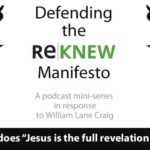We run our website the way we wished the whole internet worked: we provide high quality original content with no ads. We are funded solely by your direct support. Please consider supporting this project.
Podcast: Did Revelation Evolve or did God Evolve?
Greg discusses the revolution of God.

Send Questions To:
Dan: @thatdankent
Email: askgregboyd@gmail.com
Twitter: @reKnewOrg
Greg’s new book: Inspired Imperfection
Dan’s new book: Confident Humility
Subscribe:
Category: ReKnew Podcast
Tags: Process Theology, Revelation
Related Reading

Why Can’t God? Reflections on the Oord Interview (podcast)
Greg reflects on his interview with Thomas Jay Oord. Episode 503 http://traffic.libsyn.com/askgregboyd/Episode_0503.mp3

Sermons: A Vision of Beauty
In this short sermon clip, Greg Boyd discusses how God, science, and nature can work together to tell us the story of our universe. In the full sermon, Greg begins the series on Revelation and shows us three things to keep in mind when reading the book of Revelation. You can view the full sermon…

Redefining Transcendence
God is transcendent, which basically means that God is “other” than creation. The problem is that classical thinking about God’s “otherness” has been limited to what reason can discern about God. As a result, all that can be said about his transcendence is what God is not. We are thus unable to acquire a positive…

Why Did It Take SO Long for God to Reveal Himself in Jesus?
Greg talks about why it took God so long to reveal himself in Jesus. http://traffic.libsyn.com/askgregboyd/Episode_0048b.mp3

Podcast: Defending the Manifesto (4 of 10)
Greg responds to challenges by William Lane Craig from Craig’s podcast “Reasonable Faith.“ Greg discusses what it means to say that Jesus is the full revelation of God. http://traffic.libsyn.com/askgregboyd/Episode_0059.mp3

What is the right way to interpret Revelation?
Few biblical topics have captured the imagination of contemporary evangelicals like the book of Revelation. The recent unprecedented success of the Left Behind series is evidence of this popular fascination. Many evangelicals don’t realize that the futuristic interpretation of Revelation advocated in this popular series is only one of several interpretations evangelicals espouse. Here’s the…



